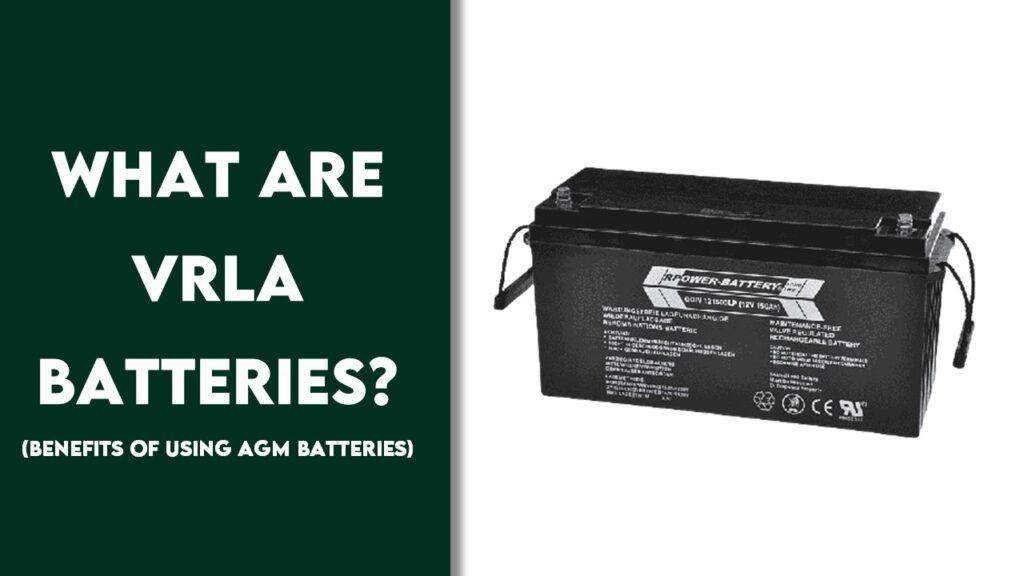Solar panel extension cables are basically the wires that let you place your solar panels wherever you need them, without worrying about being too far from the rest of your setup. In this guide, we have extensively researched, reviewed, and ranked the 7 best solar panel extension cables in 2025.
We’re reader-supported. When you buy through links on our site, we may earn an affiliate commission. As an Amazon Associate, we earn from qualifying purchases.
Our Top 7 Picks of The Best Solar Panel Extension Cables
1. Best Overall Option: BougeRV 20 Feet 10AWG Solar Extension Cable
2. Best Budget-Friendly Option: OYMSAE 25Feet SAE to SAE Extension Cable
3. Most Durable Option: GearIT 10AWG Solar Extension Cable
4. Value for Money Option: Vansdon Solar Panel Extension Cable
5. Versatile Option: JXMXRPV Solar Extension Cable
6. Waterproof Option: Oududianzi 10AWG Solar Extension Cable
7. Easy Installation Option: iGreely Solar Panel Extension Cable
What Is The Best Solar Panel Extension Cable In 2025?
Finding the best solar panel extension cables can be tricky. You need cables that are durable, efficient, and compatible with your system. Moreover, choosing the wrong cable can lead to power loss or system issues. Here’s a well-researched list of the best solar panel extension cables in 2025:
1. Best Overall Option: BougeRV 20 Feet 10AWG Solar Extension Cable
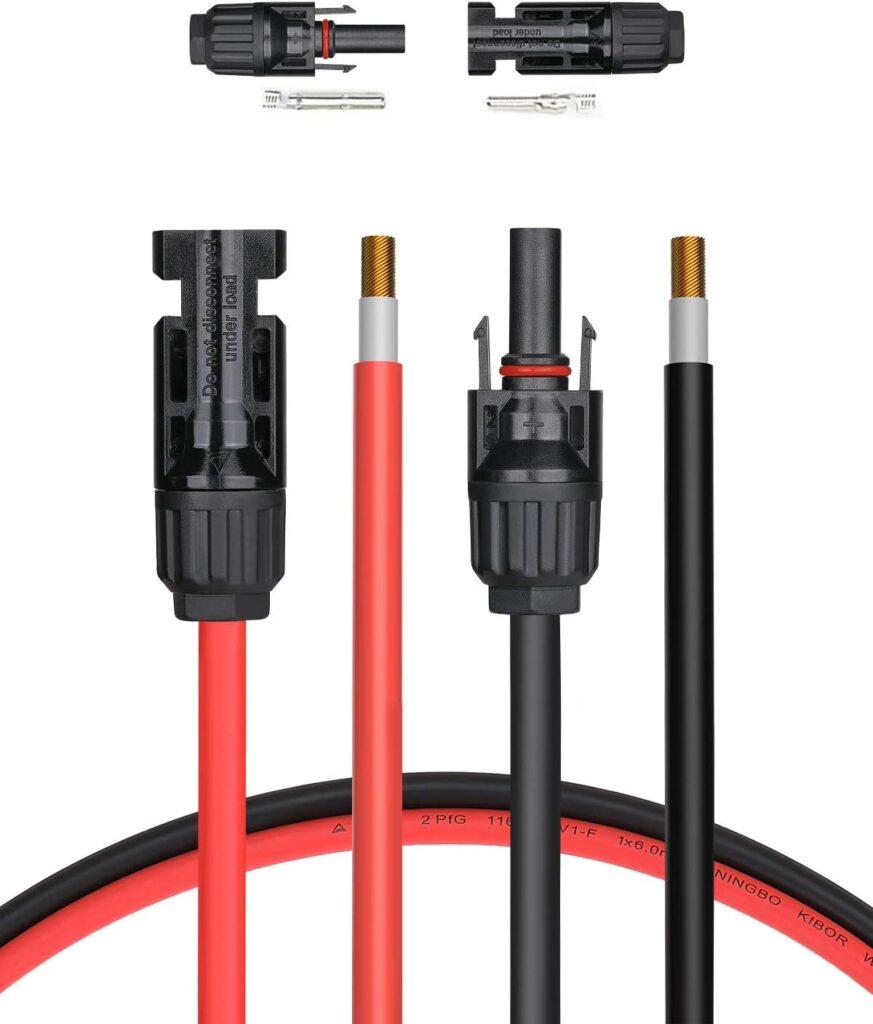
Key Specifications
- Brand: BougeRV
- Connector Type: MC4
- Cable Type: Ethernet
- Connector Gender: Male-to-Female
- Number of Pins: 4
- Length: 40 Feet (20FT Red + 20FT Black)
- Wattage: 5000 watts
- Voltage: 1000V DC
From our standpoint, the BougeRV 20 Feet 10AWG Solar Extension Cable is a solid pick for anyone who needs a reliable way to extend their solar panel setup. It’s built tough with tin-coated pure copper wiring, which helps reduce power loss and keeps your system running efficiently. Unlike thinner cables that struggle over long distances, this one holds up well and keeps the energy flow steady.
In our opinion, one of the biggest advantages of this solar panel extension cable is its durability. It’s designed for outdoor use, with UV-resistant insulation and waterproof connectors that can handle different weather conditions. Another plus is the extra pair of connectors included, making it easier to adapt to different solar setups. Whether you’re running a solar system on an RV, home, or off-grid setup, this extension cable makes things more flexible without being a hassle to install.
Pros
- Minimizes power loss with 10AWG pure copper wiring
- Strong and durable for outdoor conditions, UV-resistant and waterproof
- Comes with extra connectors for more setup options
- Secure MC4 connectors prevent accidental disconnections
Cons
- A bit on the heavier side due to the thicker gauge
- Might be longer than needed for very small solar setups
From our perspective, this solar extension cable is a great fit for anyone needing a durable, well-built option that won’t mess with energy efficiency. The combination of solid construction, reliable connectors, and good length makes it a practical choice for solar setups of different sizes. It does the job well without overcomplicating things, which is exactly what you want in a solar extension cable.
2. Best Budget-Friendly Option: OYMSAE 25Feet SAE to SAE Extension Cable
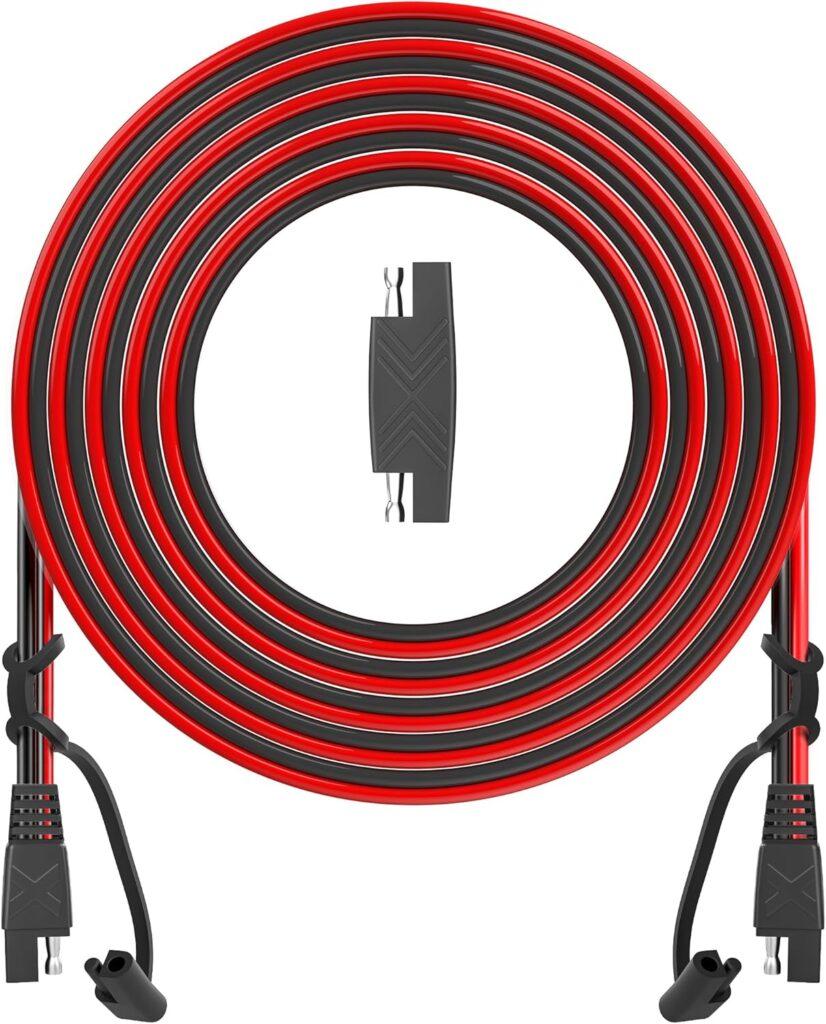
Key Specifications
- Brand: OYMSAE
- Connector Type: SAE
- Cable Type: Quick Disconnect
- Connector Gender: Male-to-Female
- Number of Pins: 2
- Length: 25 Feet
- Voltage: 12 Volts
From our standpoint, the OYMSAE 25Feet SAE to SAE Extension Cable is a good pick for anyone looking for an affordable solar extension cable without cutting corners on quality. It’s not the thickest cable out there, but for smaller solar setups, battery chargers, or RV applications, it gets the job done. The 25-foot length gives a decent amount of flexibility, and the SAE connectors make it simple to plug in and disconnect when needed.
In our view, what makes this cable stand out is its ease of use. The quick disconnect is super convenient, and the included polarity adapter helps avoid connection issues. It’s built with 16AWG copper wire, which is solid for low-voltage systems, but might not be the right fit for heavier solar loads. Still, for smaller solar panels, battery chargers, and general 12V applications, it’s a practical and straightforward solution.
Pros
- Long 25-foot cable makes setup easier, especially for RVs and small solar systems
- Quick disconnect is simple and saves time when making adjustments
- Comes with a polarity adapter to prevent connection mix-ups
- Holds up well outdoors, designed for weather resistance
Cons
- 16AWG wire is not ideal for high-power solar setups
- Lighter build compared to more heavy-duty options, but still works well for small-scale use
From our perspective, this solar extension cable is a practical and cost-effective choice for those working with smaller solar setups. It’s easy to use, flexible, and doesn’t overcomplicate things. While it may not be suited for high-power applications, it works well for basic needs, making it a proper option for anyone wanting a reliable extension cable without spending too much.
3. Most Durable Option: GearIT 10AWG Solar Extension Cable
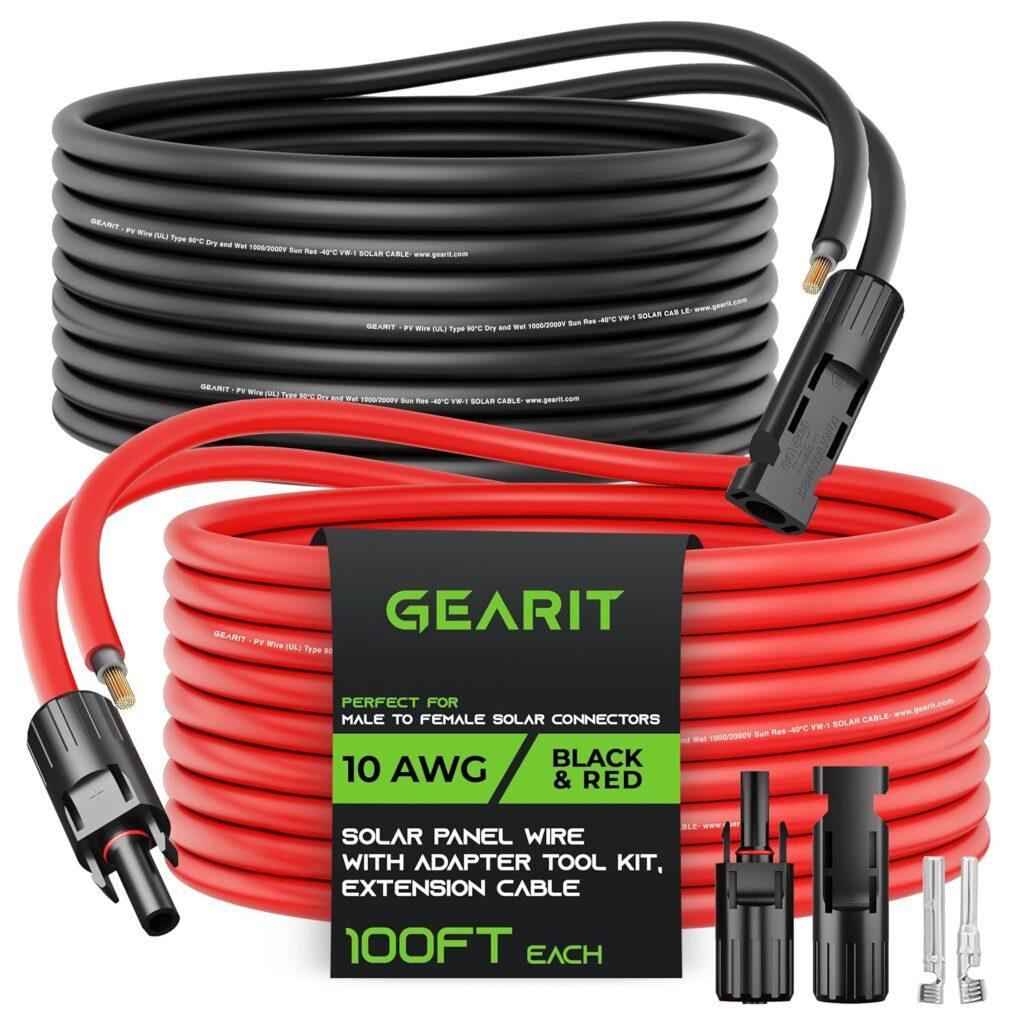
Key Specifications
- Brand: GearIT
- Connector Type: Male-to-Female
- Cable Type: OFC (Oxygen-Free Copper)
- Connector Gender: Male-to-Female
- Number of Pins: 2
- Length: 100 Feet (50FT Red + 50FT Black)
- Wattage: 200 Watts
- Voltage: 1500V DC / 1000V AC
From our perspective, the GearIT 10AWG Solar Extension Cable is built for those who need a tough, reliable cable that can handle long distances without losing power. This thing is made with oxygen-free copper, which helps keep efficiency up, even if you’re running it across a big area. The connectors feel solid and secure, and the IP67 waterproof rating means you don’t have to worry about rain, dust, or temperature swings messing with the connection.
In our view, this is a solid pick for anyone running solar panels in rough outdoor conditions, whether it’s for an RV, a home rooftop setup, or even a marine application. The length is a huge plus if you need flexibility in positioning your panels, though for smaller setups, it might be more than you actually need. The extra connectors and tool kit included make setup a little easier, which is always a bonus when dealing with solar wiring.
Pros
- Thick 10AWG copper wire helps keep power loss to a minimum
- IP67 waterproof rating makes it reliable in all weather conditions
- Extra connectors and tool kit make installation more convenient
- 100-foot length provides flexibility for larger solar setups
Cons
- A bit bulky, which might not work well in really tight spaces
- The long length is great for big setups but could be overkill for smaller ones
From our standpoint, this solar extension cable is a proper option for anyone looking for a heavy-duty cable that can last. It’s durable, handles the elements well, and keeps energy flowing efficiently over long distances. If you need a cable that won’t let you down in tough conditions, this one is a solid choice.
4. Value for Money Option: Vansdon Solar Panel Extension Cable
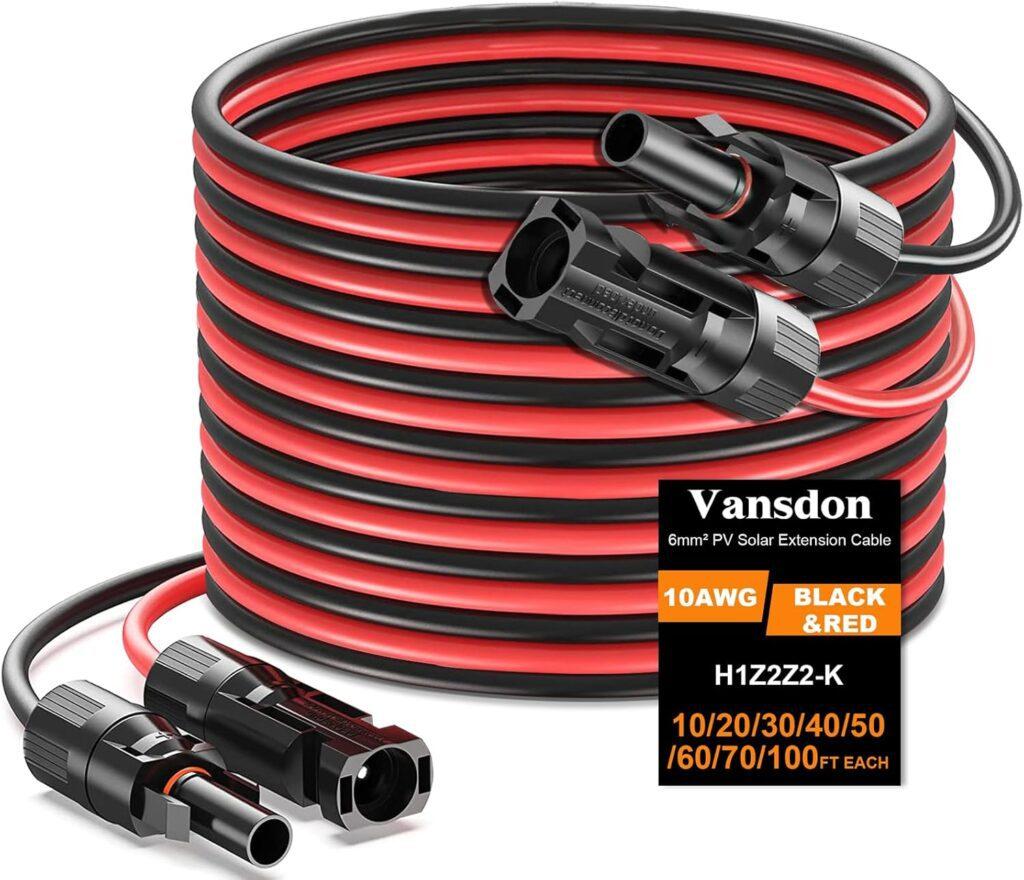
Key Specifications
- Brand: Vansdon
- Connector Type: Male-to-Female
- Cable Type: Solar Panel Cable
- Connector Gender: Male-to-Female
- Number of Pins: 2
- Length: 30 Feet (Red) + 30 Feet (Black)
- Wattage: 5000 Watts
- Voltage: 1500 Volts
From our perspective, the Vansdon Solar Panel Extension Cable is a solid option if you’re looking for something reliable without overspending. It’s got tinned copper wiring, which is great because it reduces power loss and holds up well against corrosion. The 10AWG thickness makes it sturdy and ensures efficient power flow, especially if you’re dealing with longer distances. It’s the kind of cable that does what it’s supposed to without making things complicated.
In our opinion, what really stands out is its durability. The insulation is tough enough to handle extreme weather, so whether it’s scorching hot or freezing cold, this cable is built to last. The connectors lock in securely, meaning you won’t have to worry about them slipping loose over time. It’s also a good length—not too short, not too excessive—giving you enough flexibility without a tangled mess.
Pros
- Tinned copper wiring improves conductivity and resists corrosion
- Insulated for UV and weather resistance, built for long-term outdoor use
- Secure connectors that lock in place and prevent accidental disconnections
- 30-foot length gives enough reach without unnecessary bulk
Cons
- Can be a little stiff when setting up, especially in tight spaces
- Might be longer than needed for smaller solar systems
From our standpoint, this solar panel extension cable is a proper choice if you need a well-built cable that doesn’t cost a fortune. It’s durable, efficient, and easy to work with, making it a great option for RVs, home solar systems, or off-grid setups. While it’s not the most flexible cable out there, it holds up where it matters—reliability and performance.
5. Versatile Option: JXMXRPV Solar Extension Cable
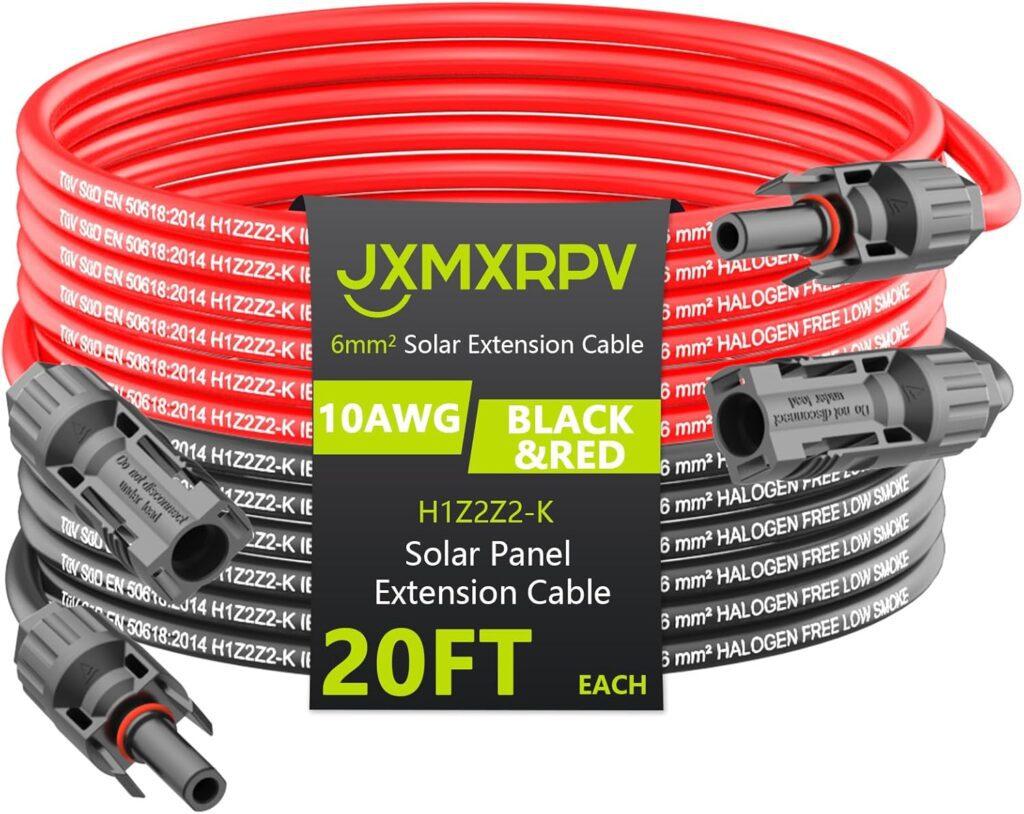
Key Specifications
- Brand: JXMXRPV
- Connector Type: Male-to-Female or Female-to-Male
- Cable Type: Solar Cable
- Connector Gender: Male-to-Female
- Number of Pins: 2
- Length: 20 Feet
- Wattage: Not specified
- Voltage: 600 Volts (DC)
From our perspective, the JXMXRPV Solar Extension Cable is one of those options that just works without any unnecessary hassle. It’s got that solid 10AWG thickness, which means it can handle power transmission without a noticeable drop. That’s a big deal when you’re setting up a solar system, especially if you’re running cables over a decent distance. What’s nice is that it’s built to last outdoors—rain, heat, even cold—it doesn’t seem to care. That makes it a great pick whether you’re working on a rooftop system, an RV setup, or even a marine application.
In our opinion, one of the standout things here is the tool-free connectors. Some cables make installation a headache with tricky locks, but this one? Just plug and go, no extra tools required. The connectors snap in tightly, so there’s no annoying looseness that might cause connection issues down the line. The 20-foot length is decent for most standard setups, though if you need something for a larger installation, you might want to check if this is enough. Still, it’s a flexible, well-built cable that doesn’t overcomplicate things.
Pros
- Thick 10AWG wire helps keep power loss low
- Weatherproof build makes it ideal for long-term outdoor use
- Tool-free connectors make setup fast and easy
- Works well for different setups, from home solar panels to RVs and boats
Cons
- Might be a bit short for larger solar installations
- Can be slightly stiff when bending it around corners
From our standpoint, this JXMXRPV solar cable is the kind of thing you want when you need something that’s easy to work with but still tough enough for outdoor use. The connectors feel secure, the cable itself is well-insulated, and it does what it’s supposed to do without overcomplicating the process. If you’re looking for a straightforward, reliable cable that won’t give you headaches, this one is a proper choice.
6. Waterproof Option: Oududianzi 10AWG Solar Extension Cable
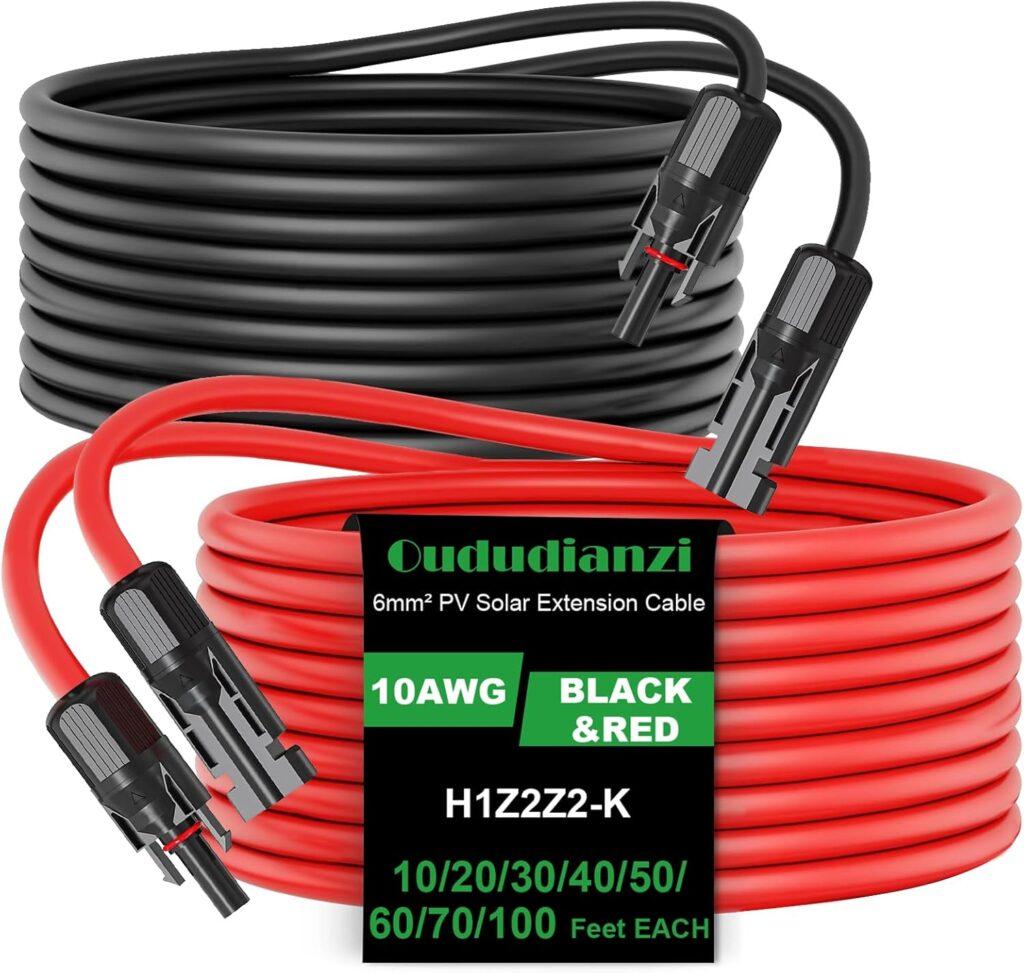
Key Specifications
- Brand: Oududianzi
- Connector Type: Solar Panel Connectors
- Cable Type: Solar Wire
- Connector Gender: Female-to-Male, Male-to-Female
- Number of Pins: 2
- Length: 30 Feet (Red) + 30 Feet (Black)
- Wattage: Not specified
- Voltage: 1500 Volts (DC)
From our perspective, the Oududianzi 10AWG Solar Extension Cable stands out for its tough, weather-resistant design. If you need a cable that can handle outdoor exposure without degrading over time, this one seems to check all the boxes. It’s built with dual-layer insulation and an IP67 waterproof rating, meaning it holds up against rain, dust, and temperature swings. The tinned copper wiring helps with conductivity, which means less power loss over longer distances.
In our view, what makes this cable even better is how easy it is to set up. The connectors are pre-installed, so you don’t have to struggle with assembly. They snap in securely, which reduces the chance of loose connections. Furthermore, the length is practical—long enough for flexibility but not so long that it becomes a hassle to manage. If you’re looking for a sturdy extension cable that works in different environments, this one is worth considering.
Pros
- Thick 10AWG wire helps reduce power loss over long distances
- IP67 waterproof rating makes it durable in extreme weather conditions
- Pre-installed connectors make setup fast and hassle-free
- Well-insulated to resist heat, cold, and outdoor exposure
Cons
- Slightly stiffer than some cables, which might make bending trickier
- Might be longer than needed for compact solar setups
From our standpoint, this solar panel extension cable is a proper choice for those who need a durable, weatherproof cable that won’t give out after a few months. It’s well-built, easy to install, and provides a stable connection. While the stiffness could be a minor drawback for tight spaces, it’s a small trade-off for reliability in tough outdoor conditions. If you need a cable that can handle the elements, this one delivers.
7. Easy Installation Option: iGreely Solar Panel Extension Cable
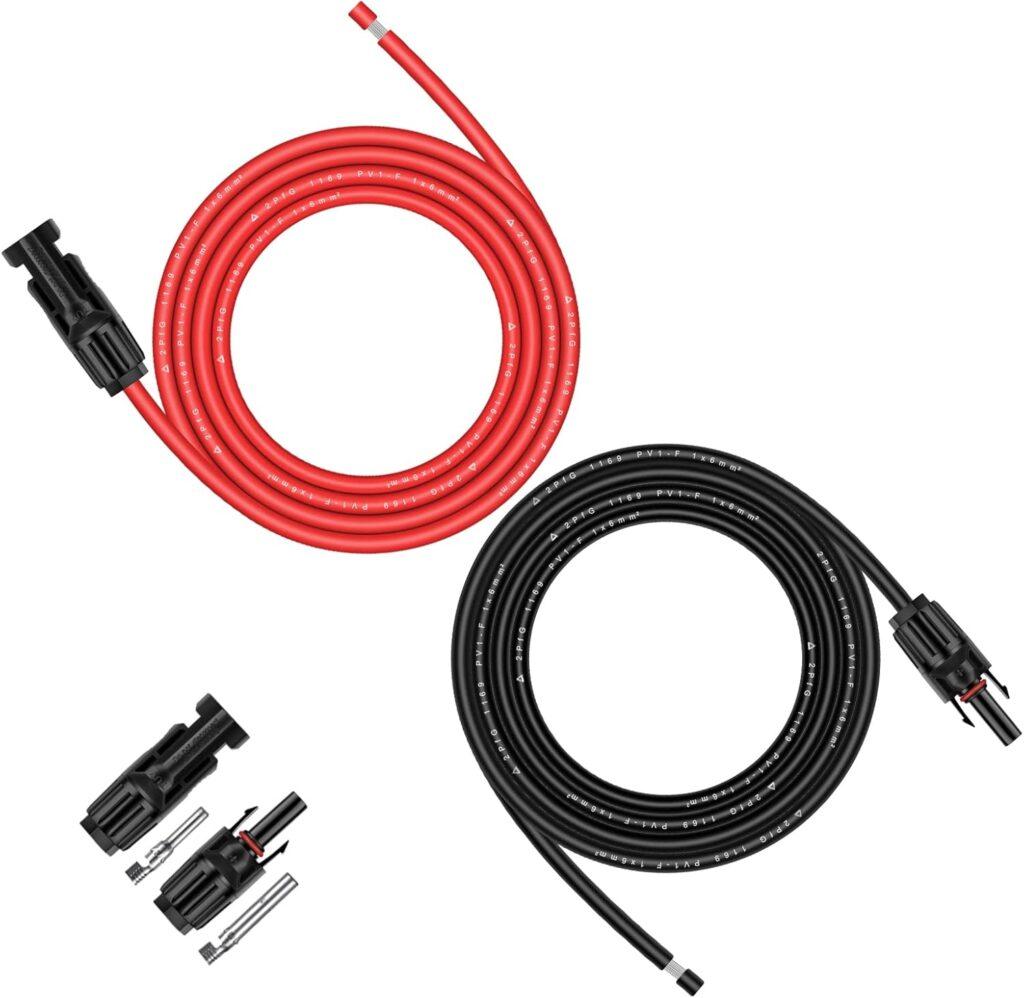
Key Specifications
- Brand: iGreely
- Connector Type: Solar
- Cable Type: Tinned Copper Wire
- Connector Gender: Female-to-Female
- Number of Pins: 2
- Length: 10 Feet (Red) + 10 Feet (Black)
- Wattage: Not specified
- Voltage: 1000 Volts
From our perspective, the iGreely Solar Panel Extension Cable is the kind of cable that keeps things simple. If you want an easy-to-install extension cable that doesn’t require any extra tools, this one does the job. The connectors are already in place, so it’s really just plug and play. The 10AWG thickness helps with power flow, reducing any energy loss when connecting your solar panels.
In our view, what makes this cable stand out is its durability. It’s built with weather-resistant materials that can handle high and low temperatures, UV exposure, and moisture. Furthermore, the self-locking system on the connectors ensures a secure fit, so you don’t have to worry about loose connections over time. The 10-foot length isn’t the longest, but it works well for smaller setups or when you just need a little extra reach.
Pros
- Pre-installed connectors make setup quick and hassle-free
- UV-resistant and weatherproof for long-term outdoor use
- Secure self-locking connectors prevent accidental disconnections
- 10AWG thickness keeps power loss minimal over short distances
Cons
- Might be too short for larger solar setups
- Slightly rigid, making it less flexible for tight spaces
From our standpoint, this solar panel extension cable is a proper choice for those who need an easy-to-use and reliable option. It’s sturdy, connects seamlessly, and is built to last outdoors. While it may not be the longest cable, it’s a great fit for those looking for a simple, no-fuss installation.
How the Solar Panel Extension Cables Were Tested
Solar panel extension cables are tested through a combination of technical evaluations and real-world feedback. These methods help determine how well the cables perform in practical use and under different conditions. Reviews and forums also play a key role, providing valuable insights from customers who’ve used these cables over time.
- Durability Testing: Cables are exposed to extreme outdoor conditions, including high UV exposure, rain, and temperature swings, to assess their ability to withstand harsh environments.
- Performance Under Load: Voltage drops and power loss are measured by running cables at their maximum recommended distances and loads, ensuring they can handle the demands of solar systems.
- Connector Reliability: Connectors like MC4 are repeatedly connected and disconnected to check for secure fits, waterproofing, and long-term reliability.
- Flexibility and Handling: Cables are bent, twisted, and routed through tight spaces to test their durability and ease of use without risking internal damage.
- User Feedback: Customer reviews and discussions on forums provide real-life experiences, highlighting recurring issues or praises, such as durability, ease of installation, and customer satisfaction.
- Longevity Simulation: Cables are tested under simulated long-term conditions, including heavy loads, to evaluate their lifespan and reliability over time.
- Design and Practicality: Factors like weatherproofing, cable management, and overall ease of handling are assessed to ensure user-friendliness in everyday applications.
This combination of tests and customer feedback provides a balanced view of a cable’s performance, reliability, and usability. Insights from forums and reviews help identify potential strengths and weaknesses, ensuring the cables chosen are both practical and durable for long-term use in solar systems.
What Are Solar Panel Extension Cables?
Solar panel extension cables are just longer wires that help connect your solar panels to the rest of your setup, like your inverter or charge controller. They’re built tough for outdoor use, with connectors like MC4 that keep everything secure and working properly. These cables let you put your panels wherever they’ll catch the most sun, even if that spot isn’t close to the rest of your system. It’s a simple way to make your solar system more flexible and useful.
Why Do You Need Solar Panel Extension Cables?
Sometimes, the wires that come with your solar panels just aren’t long enough. It can be frustrating when the best spot for your panels is too far from your inverter or battery. That’s where extension cables come in. They give you more options to set things up the way you need.
- Flexibility in Placement: You can place your panels where they’ll get the most sun.
- Overcoming Distance Problems: These cables help connect panels to your system even when they’re far apart.
- Preventing Power Loss: With the right gauge cables, you avoid losing power over longer distances.
- Easier Expansion: Makes adding more panels down the line less of a hassle.
- Durable for Outdoors: They’re built to handle rain, UV rays, and other weather conditions.
At the end of the day, extension cables make your life easier by letting you set up your solar system in a way that works best for you. They’re a small investment that can make a big difference.
What Types of Solar Panel Extension Cables Are Available?
There’s no one-size-fits-all when it comes to solar panel extension cables. They come in different types based on connectors, wire gauges, lengths, and specific uses, making it easier to find one that fits your setup.
By Connector Type
Connector type is one of the first things to look at when choosing solar panel extension cables. MC4 connectors are the most common and widely used because they’re secure, waterproof, and easy to connect. Some systems might use Anderson connectors or proprietary options, depending on the brand or setup. It’s important to match the connector type with your solar panels and the rest of your system for a seamless connection.
By Wire Gauge
The wire gauge determines how much current the cable can handle and how much power loss occurs over distance.
- 10 AWG: Best for longer runs and higher power systems; minimizes power loss.
- 12 AWG: A good balance for medium-length runs and moderate power needs.
- 14 AWG: Suitable for shorter distances or smaller solar setups.
Choosing the right wire gauge depends on the size of your system and how far the cables need to run. Thicker cables (lower AWG numbers) are better for preventing power loss over longer distances.
By Cable Length
The length of the extension cable is another key factor. Too short, and you’ll struggle with placement; too long, and you might face power loss.
- 10-15 feet: Ideal for small, portable setups like RVs or camping.
- 20-50 feet: Great for residential or off-grid systems needing more flexibility.
- Over 50 feet: Works for large systems, but only with a thick enough gauge.
Picking the right length ensures you can place your panels where they perform best without compromising efficiency.
By Application
Extension cables are also categorized by their specific use cases. Each application might have slightly different needs.
- Portable Solar Systems: Lightweight, flexible cables for camping or RV use.
- Residential Solar Systems: Durable, weatherproof cables designed for outdoor rooftops.
- Off-Grid Systems: Heavy-duty cables that handle high power and longer distances.
- Commercial Systems: High-performance cables for industrial or large-scale solar setups.
The type of cable you choose depends on how and where you’ll use your solar power system. Matching the cable to your application ensures a setup that’s reliable and efficient whether its portable solar power stations or solar generators.
Key Features to Look for When Buying Solar Panel Extension Cables?
When buying solar panel extension cables, you want to choose options that are reliable and suited for your specific setup. From materials to compatibility, each feature plays a role in ensuring efficiency and durability.
What Materials Should You Look For?
The type of material used in the cable determines how well it conducts electricity. Copper wiring is the gold standard for solar cables because it offers better conductivity and lower power loss compared to aluminum. Although aluminum cables are cheaper, they’re less efficient and prone to more resistance, which can lead to power drops. If efficiency is a priority, copper cables are the way to go.
Why Is UV Resistance Important?
Since solar panel cables are often exposed to the sun, UV resistance is crucial. Cables without UV protection can crack, degrade, or lose their insulation, leading to potential failures over time. UV-resistant cables last longer and maintain their integrity, even under constant exposure to harsh weather. For outdoor installations, always opt for cables designed to handle sunlight, rain, and temperature changes.
How to Match Voltage and Amp Ratings?
Matching the voltage and amp ratings of your cables to your solar system is critical. If the cables are underrated, they can overheat or fail under load.
Here’s a simple calculation:
To calculate the current (amps), use the formula:
Current (Amps) = Power (Watts) ÷ Voltage (Volts)
For example: If your solar panel produces 400 watts at 12 volts, the current is:
400 ÷ 12 = 33.3 Amps
Make sure the cable you choose can handle this current. If not, go for a higher gauge cable to avoid overheating or energy loss.
What About Connector Compatibility?
The connectors on your extension cables need to match the connectors on your solar panels and inverter. MC4 connectors are the most common and widely compatible with most systems. If your system uses a different connector type, you may need adapters or specific cables. Always double-check the connector type before purchasing to avoid installation headaches. Matching connectors ensure a secure and efficient connection for your solar system.
How to Install and Use Solar Panel Extension Cables?
Installing solar panel extension cables is a simple process, but getting it right is essential for optimal performance. Here’s how you can set up your extension cables step by step.
Steps to Install and Use Solar Panel Extension Cables
- Check Compatibility: Ensure the extension cables match your solar panel of your solar generator connectors and system requirements.
- Measure the Distance: Measure the distance between your panels and other components to choose the right cable length.
- Connect the Cables: Securely attach the connectors (usually MC4) to the panels and the charge controller or inverter.
- Secure the Cables: Use cable ties or clips to keep the cables organized and protected from physical damage.
- Test the System: Once everything is connected, test the setup to confirm that the power flow is consistent and there’s no voltage drop.
Proper installation ensures your solar system runs efficiently and avoids unnecessary issues. Always double-check connections and monitor performance after setup.
What Are the Advantages of Using Solar Panel Extension Cables?
Solar panel extension cables offer several benefits that make your system more efficient and easier to use. Here’s why they’re a must-have for most setups.
- Better Placement Flexibility: Allows you to position panels where sunlight is optimal, even if far from other components.
- Improved System Efficiency: Reduces power loss by using the right gauge and length of cables.
- Easier System Expansion: Makes it simple to add more panels as your power needs grow.
- Durability: Designed for outdoor use, they withstand harsh weather conditions.
- Tidy Setup: Helps keep your solar system organized and less cluttered.
With solar panel extension cables, you gain flexibility and reliability, making your solar system work better in the long run. They’re a small addition that has a big impact on efficiency and convenience.
How Long Should Solar Panel Extension Cables Be?
The length of solar panel extension cables plays a major role in your system’s performance. Too short, and your setup won’t be practical; too long, and you risk power loss.
- Short Cables (10-15 feet): Ideal for compact systems like portable solar kits or RVs.
- Medium-Length Cables (20-50 feet): Great for residential setups or when you need flexibility in panel placement.
- Long Cables (50+ feet): Useful for large off-grid systems but require thicker gauge cables to prevent energy loss.
Choosing the right cable length depends on your specific setup and how far your panels are from your charge controller or inverter. Always balance the need for flexibility with the risk of power loss over longer distances.
What Common Mistakes Should You Avoid?
Using solar panel extension cables incorrectly can lead to inefficiencies and potential system failures. Avoid these common mistakes to ensure your setup runs smoothly:
- Using the Wrong Wire Gauge: Choosing a cable that’s too thin can cause energy loss and overheating.
- Ignoring Connector Compatibility: Mismatched connectors can lead to loose connections or no power flow.
- Exceeding Cable Length Limits: Overly long cables can result in significant voltage drops.
- Skipping Weatherproof Options: Using cables not designed for outdoor use can cause insulation damage over time.
- Improper Securing of Cables: Leaving cables loosely hanging can lead to wear, damage, or disconnections.
Paying attention to these details ensures your solar system operates efficiently and avoids unnecessary repairs or replacements. A bit of effort upfront saves a lot of trouble later.
How to Maintain Solar Panel Extension Cables?
Maintaining solar panel extension cables is essential to keep your system running smoothly for years. Here are some tips to help you take care of them:
- Inspect Regularly: Check for cracks, wear, or damage on the insulation and connectors.
- Clean Occasionally: Wipe off dirt or debris to prevent buildup that could affect performance.
- Protect Against Weather: Use UV-resistant covers or conduit if cables are exposed to extreme sunlight.
- Secure Properly: Ensure cables are tied down or clipped to avoid unnecessary movement or strain.
- Replace When Necessary: If a cable shows significant wear or damage, replace it immediately to avoid system failure.
Simple maintenance habits go a long way in extending the life of your solar panel extension cables. Keeping them in good condition means your system stays efficient and reliable.
Wrapping It Up!
Solar panel extension cables are an essential component for creating a reliable and efficient solar power system. They allow you to position solar panels in the best possible locations to capture maximum sunlight, even if those spots are far from the rest of your setup. This flexibility is invaluable for residential, portable, and off-grid systems, ensuring you get the most out of your solar investment.
Selecting the right extension cable goes beyond just picking the longest one. It’s important to consider factors like wire gauge, length, and connector compatibility. A thicker cable (lower AWG) reduces power loss over longer distances, while durable, UV-resistant materials ensure the cable can handle outdoor conditions. Compatibility with your solar panels and inverter, especially using connectors like MC4, is another key aspect to ensure smooth performance.
By following the tips in this guide, you can confidently choose the best solar panel extension cables for your specific needs. Avoiding common mistakes, such as using the wrong gauge or ignoring weather resistance, and regularly maintaining your cables will help you build a solar setup that is efficient, scalable, and long-lasting. With the right cables in place, your solar system will run smoothly for years to come.
FAQs About Solar Panel Extension Cables
How do solar panel extension cables affect energy efficiency?
The efficiency of your solar system can be significantly impacted by the wrong cable. If the cable is too long or has a smaller gauge (higher AWG number), it can cause voltage drops and energy loss. Choosing a thicker cable for longer distances minimizes this problem, ensuring your system runs efficiently.
Are all solar panel extension cables waterproof?
No, not all solar panel extension cables are waterproof. While some cables are designed specifically for outdoor use and come with waterproof and UV-resistant insulation, others are not meant to handle harsh weather conditions. Always check the product specifications to confirm if the cable is suitable for outdoor use.
Can I use generic cables instead of solar-specific extension cables?
Using generic cables instead of solar-specific ones is not recommended. Generic cables may not be designed to handle the current produced by solar panels or withstand outdoor conditions like extreme heat or UV exposure. Solar-specific extension cables are built for efficiency, safety, and durability, making them the better choice.
What’s the ideal gauge for a 1000W solar panel system?
For a 1000W solar panel system operating at 12 volts, 10 AWG cables are typically recommended. This gauge handles higher currents efficiently without significant power loss over moderate distances. For longer runs, an even thicker cable, such as 8 AWG, might be needed to avoid voltage drops.
Are solar panel extension cables compatible with all brands?
Most solar panel extension cables with MC4 connectors are designed to be universal and compatible with a wide range of brands. However, some systems may use proprietary connectors. It’s always a good idea to double-check the connector type on both the cables and your system to ensure compatibility before purchasing.
At our core, we’re a group of passionate generator, inverter, solar energy, battery enthusiasts. We dive deep into the world of tech, especially when it’s about powering your home, RV or outdoors. We try to provide as much value to the readers with our information and how to blog articles as possible. For affiliate articles our honest and transparent reviews of essential tech products are rooted in real-world experience. We take great satisfaction in offering unbiased evaluations, ensuring that you can make informed decisions when investing in your desired techs.




